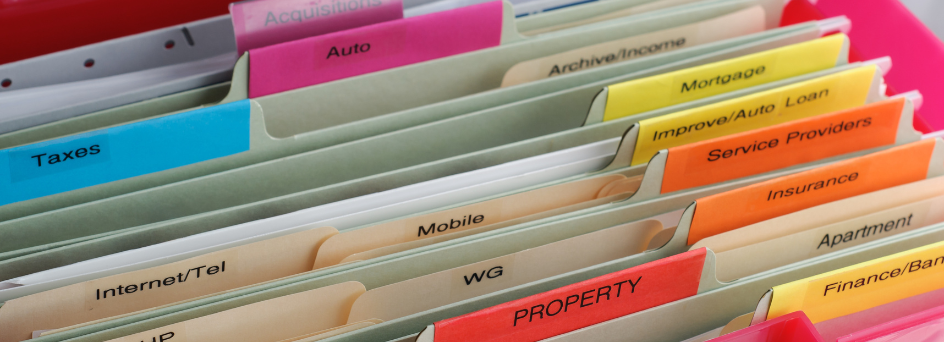How to Organize Financial Documents and Keep Them Safe
Organizing financial documents is a crucial aspect of personal and professional financial management. In today’s dynamic economic landscape, where financial transactions are frequent and diverse, having a systematic approach to managing financial paperwork can alleviate stress and streamline financial decision-making processes. This article explores the significance of organizing financial documents and the multitude of benefits it offers.
Importance of Organizing Financial Documents
Organizing financial documents is akin to laying a solid foundation for a building. It provides structure and clarity to your financial landscape, enabling you to navigate through various financial obligations, investments, and transactions with ease.
Without proper organization, financial documents can become scattered, leading to confusion, missed deadlines, and even financial losses.
Benefits of Organized Financial Documents
The benefits of organizing financial documents are manifold.
Firstly, it promotes efficiency by allowing easy access to pertinent financial information when needed. This, in turn, saves time and reduces the likelihood of missing important deadlines or opportunities.
Secondly, organized financial documents facilitate better financial planning and decision-making by providing a comprehensive overview of one’s financial standing.
Additionally, it enhances security by safeguarding sensitive financial information and reducing the risk of identity theft or fraud.
Setting Up Your System
Choosing a Filing Method
When it comes to organizing financial documents, the first step is to choose a suitable filing method. This decision often boils down to whether to opt for a digital or physical filing system, each with its own set of considerations.
Digital vs. Physical
Digital filing systems involve storing documents electronically using computers, external hard drives, or cloud-based services. Physical filing systems, on the other hand, utilize physical storage solutions such as file cabinets or folders. Deciding between the two depends on factors such as convenience, accessibility, and personal preference.
Considerations for Each Method
Digital filing systems offer the advantage of accessibility from anywhere with an internet connection, as well as the ability to easily search and retrieve documents using keywords. However, they require adequate cybersecurity measures to safeguard against data breaches or hacking incidents.
Physical filing systems, while more tangible and familiar to some, require physical storage space and diligent organization to prevent clutter and misplacement.
Storage and Security is a huge factor in deciding whether to go with either physical or digital method.

Selecting Storage Solutions
Choosing the right storage solutions is crucial for preserving the integrity and accessibility of your financial documents. Depending on your preference and circumstances, you may opt for physical storage solutions such as file cabinets or digital solutions such as cloud storage services.
File Cabinets
File cabinets provide a traditional yet reliable method of storing physical documents. Invest in high-quality file cabinets with ample space and sturdy construction to accommodate your growing collection of financial paperwork. Organize documents within file cabinets using labeled folders or dividers for easy retrieval.
Another option that is worth considering is a safety deposit box which you can rent from banks or credit unions. These serve as storage space for important documents, heirloom jewelry, gold, or even cash and provide protection from fire, theft, or other potential damage.
If you do not want to pay a monthly rental for these boxes, you can invest in a fireproof safe box, which you can put in a hidden place inside your home. It is secured by a key or other type of locking mechanism.
Cloud Storage Services
Cloud storage services offer the convenience of storing documents digitally, accessible from any internet-connected device. Popular cloud storage platforms such as Google Drive, Dropbox, or Microsoft OneDrive provide secure and scalable solutions for storing and organizing financial documents for free and paid plans. Take advantage of features such as folder organization, file encryption, and multi-factor authentication to enhance security.

Ensuring Security
Maintaining the security of your financial documents is paramount to protecting sensitive information and preventing unauthorized access. Implementing robust security measures is essential, regardless of whether you opt for physical or digital storage solutions.
If you use a filing cabinet, or a safe, be sure to lock it and keep the key in a secure location. You can keep a duplicate key in a safety box outside of your home. This can be rented for a small fee from a local bank.
Encryption and Password Protection
For digital storage solutions, encryption and password protection are critical safeguards against data breaches or unauthorized access. Encrypt sensitive financial documents before uploading them to cloud storage and use strong, unique passwords for account access. Enable two-factor authentication whenever possible to add an extra layer of security.
I personally like Lastpass for storing my passwords. It generates long combinations of letters, numbers and symbols, and stores passwords of different accounts in the vault. I only need to keep one main password for my Lastpass account.
Backup Plans
In addition to encryption and password protection, having backup plans in place is essential for safeguarding against data loss or corruption. Regularly backup your financial documents using redundant storage methods, such as external hard drives or backup servers.
Create Categories
Once you’ve chosen a filing method, the next step is to create categories for organizing your financial documents effectively. Establishing clear and logical categories is essential for easy retrieval and maintenance of documents.
Essential Categories
Some essential categories to consider include:
- Income
- Expenses,
- Taxes
- Investments
- Insurance
- Loans
- Savings
These categories serve as the foundation for organizing various financial documents such as pay stubs, bills, receipts, investment statements, insurance policies, and loan agreements.
Additional Categories for Specific Needs
In addition to essential categories, consider creating additional categories tailored to your specific financial situation and goals.
Business:
- Business expenses
- Invoices
- Contracts
Debt:
- Credit cards
- Car loans
- Student loans
- Tax debt
- Personal loans
Insurance:
- Homeowner’s
- Renter’s
- Auto
- Health
- Long Term Care
- Disability
- Flood
- Business
- Life
Retirement
- Bank
- Investment
- Social Security
- Retirement
- Pension
Estate Plan
- Last will and testament
- Trust
- Power of Attorney
- Advanced Medical Directive
Identity
- Passport,
- Social Security cards
- Birth Certificate
- Marriage license
- Baptismal certificate
- Naturalization certificate/resident alien card
- Medical records
House
- Utilities
- Title/Deed
- Home improvement
- Mortgage loan
Auto
- Title
- Maintenance
- Lease or loan agreement
Gather All Documents
Once you’ve established your filing system and categories, it’s time to gather all relevant financial documents. This may involve collecting paperwork from various sources such as banks, employers, investment firms, and insurance providers.
Identifying Relevant Documents
As you gather documents, be mindful of identifying those that are relevant and important for your financial records. This includes documents such as bank statements, utility bills, credit card statements, tax returns, investment statements, insurance policies, and legal agreements.
Dealing with Outdated or Unnecessary Documents
As you sift through your financial documents, you may come across outdated or unnecessary paperwork. It’s essential to dispose of these documents securely to avoid clutter and confusion. Shredding sensitive documents containing personal or financial information is recommended to prevent identity theft or fraud.
How long should I keep my tax returns?
Importance of Consistency
Consistency in sorting and organizing financial documents is essential for maintaining an efficient filing system. Make it a habit to file documents promptly upon receipt and to adhere to the established categories and sorting criteria. This ensures that your financial records remain accurate, up-to-date, and easily accessible when needed.
While this is no easy task and can definitely take a few days to complete, it is well worth the trouble! It gives you a sense of security knowing your important documents are safe and sound. This also paves the way for more in-depth financial planning. When I do my financial strategy session, preparing and gathering financial documents is a necessary step. Ready to do some planning?
Book a consultation here
*********
Sheilla Vidal is a Retirement Income Certified Professional RICP® and life insurance broker. Sheilla is also a physical therapist, wife, mother of two, and one of the caregivers for her 86-year-old father. She is an avid learner. She writes, speaks, and recognizes that her work in helping clients live with dignity is her God-given mission.



